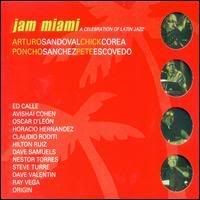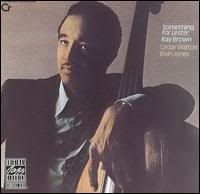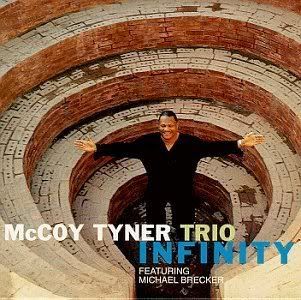VA - Jam Miami: A Celebration of Latin Jazz

VA - Jam Miami: A Celebration of Latin Jazz
2000 - Concord Jazz - CBR@320 KB/s
first posted by Professor freddy several times @ easytunz.com
Maybe the Prof has posted this album too often, but IFHO it is [b]the[/b] finest hot, live, Latin jazz album ever recorded and is lovingly presented to you once again. - Professor freddy, PFJ&BU
This album was recorded on 18 May 2000 in Miami, Florida, with the live performance dedicated to bandleader and timbales king Tito Puente. At the time, Tito Puente had suffered a heart attack and was in the hospital. Tito Puente died 31 May 2000 in New York City.
REVIEW: "I just want to celebrate" is the theme of Jam Miami: A Celebration of Latin Jazz, recorded live in Miami, Florida, by legendary jazz masters Chick Corea, Arturo Sandoval, Pete Escovedo, and Poncho Sanchez. The heat and energy emanating from this incredible concert, one that was dedicated to their friend and mentor Tito Puente, is preserved in an excellent collection of ten songs that feature an array of stellar arrangers, composers, and musicians. Ray Vega, Steve Turre, Avishai Cohen, Dave Samuels, Dave Valentin, Ed Calle, Nestor Torres, Oscar D'Leon, Horacio Hernandez, Claudio Roditi, Hilton Ruiz, Origin, and the Latin Jazz All-Star Band are having the time of their lives and really do jam on this one. Opening with the Latin soul hit "Guachi Guaro," this great collective introduces their stylistic diversity in a blaze of Sandoval trumpet glory that defies the conventional range of the instrument. Their spirits continue to soar with Dave Valentin blowing awesome flute trills in his solos on Ray Vega's arrangement of "Medley Para Tito." Vega's heartfelt salute featuring "Ran Kan Kan" and "Oye Como Va" is a definite jam, and from the sound of the cheers coming from the audience, the spirit of the recently departed Tito Puente must have filled the room. "Wigwam," the Grammy-nominated song by Chick Corea, features Origin at the core of its big-band arrangement. This expanded version offers listeners an exceptional opportunity to hear great improvisations and solos by the quintet backed by an exciting big-band format. Poncho Sanchez's conga mastery is historic on "Poncho Con Su Tambor," and for two minutes, he unloads his percussive thunder on this solo triumph. "A Mis Abuelos," a ten-minute masterpiece written by Arturo Sandoval, features his brilliant trumpet and flügelhorn playing surrounded by a dramatic display of Spanish beauty, spirituality, and fire. Horacio Hernandez on drums, Leo Quintero on guitar, and Chick Corea on Fender Rhodes are blazing against a backdrop of blaring horn charts that will send good chills down your spine. They end the set with a fiery jam of Desi Arnaz's, "Theme From I Love Lucy." This CD contains one great show that celebrates the innovative music of a multi-generational Latin jazz "family" and together they capture the ambience and heritage of many phenomenal Latin jazz experiences. - Paula Edelstein, AMG
Credits
Jeff Ballard - Percussion, Drums
Joe Barati - Trombone
Richard Bravo - Percussion
Michael Brignola - Sax (Baritone)
Ed Calle - Sax (Tenor)
Jason Carder - Trumpet
Avishai Cohen - Bass
Chick Corea - Fender Rhodes
Steve Davis
Oscar d'León - Vocals
Pete Escovedo - Timbales
Tim Garland - Sax (Tenor)
Horacio "El Negro" Hernández - Percussion, Drums
The Latin Jazz All Stars Big Band
Nicky Orta - Bass
Leo Quintero - Guitar
Eddie Resto
Claudio Roditi - Trumpet
Robert Rodriguez - Performer
Billy Ross - Sax (Alto)
Hilton Ruiz - Piano
Dave Samuels - Vibraphone
Poncho Sanchez - Congas
Arturo Sandoval - Trumpet, Flugelhorn
Dana Teboe - Trombone
Nestor Torres - Flute
Steve Turre - Trombone, Conch Shell
Dave Valentin - Flute
Ray Vega - Trumpet
Steve Wilson
Tracks
1 Guachi Guaro (Soul Sauce) - 6:37
2 A Night in Tunisia - 7:08
3 Ran Kan Kan/Oye Como Va - Puente - 8:29
4 Ican - 7:07
5 Wigwam - 5:31
6 Ven Morena - 8:45
7 Poncho con Su Tambor - Sanchez - 7:38
8 Bésame Mama - 2:01
9 A Mis Abuelos - 10:51
10 Theme from I Love Lucy - 7:04
Releases
2000 CD Concord Jazz 4899
File Sizes: 95.8, 64.6 MB
Sound Quality: CBR@320 KB/s



